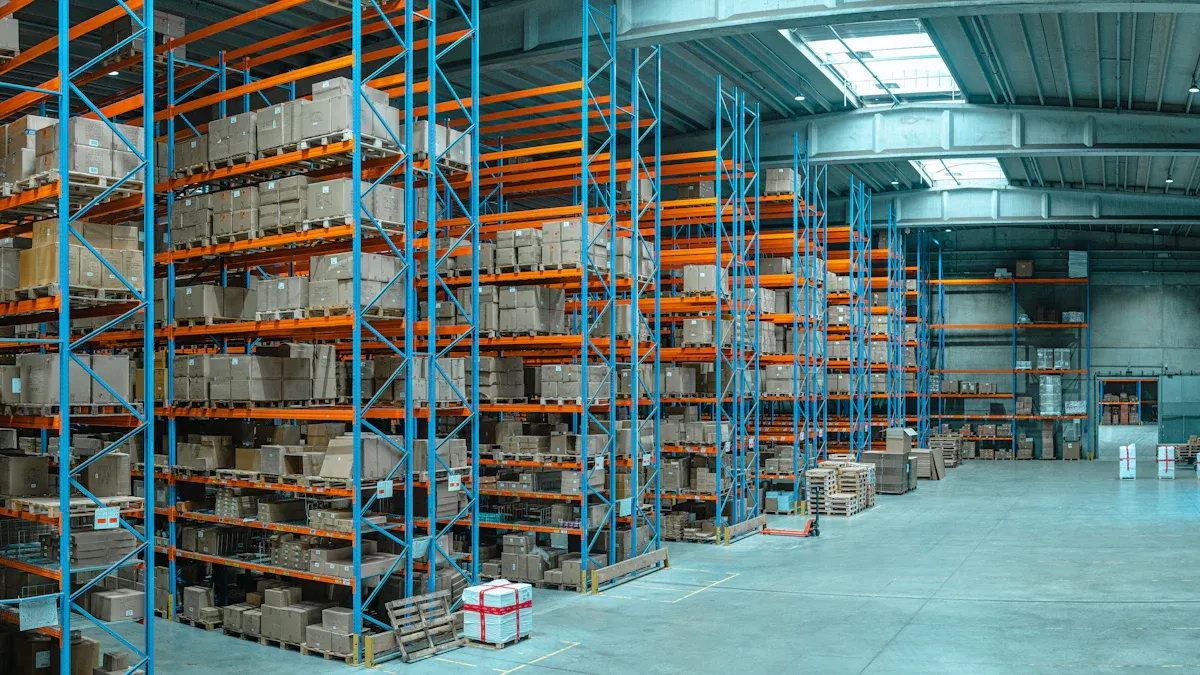US - Mexico Manufacturing Supply Chain: How to Thrive Amidst Tariff Uncertainties

Adapting to tariff uncertainties demands strategic planning and innovative approaches. The US-Mexico manufacturing supply chain plays a pivotal role in global trade, with 23% of U.S. exports directed to Canada and Mexico, compared to only 5% to China. Over 70% of Mexican exports flow to the U.S. and Canada, showcasing the region's interconnectedness. JUSDA's advanced solutions, such as JusTrade and JUSDASR, empower businesses to navigate these complexities efficiently. By leveraging technology and expertise, JUSDA ensures seamless operations, helping companies maintain resilience in an ever-changing trade landscape.
Key Takeaways
Use many suppliers to lower risks and avoid relying on one.
Use tools like JUSDA's JusTrade to make customs easier and work faster.
Move production closer to save money and be more flexible.
Build strong partnerships with others to handle trade changes better.
Take advantage of the USMCA deal to compete and reach more markets.
Understanding Tariff Uncertainties in the Manufacturing Supply Chain
The Current Tariff Landscape and Its Implications
The US-Mexico manufacturing supply chain faces significant challenges due to evolving tariff policies. Recent changes, such as the elimination of Rule 8 exemptions, have increased costs for companies importing sensitive goods. New tariffs, ranging from 5% to 50%, have further complicated trade dynamics. Additionally, the suspension of Rule 8 permit renewals has limited temporary import duty exemptions, impacting industries reliant on cross-border trade.
These policy shifts create uncertainty for businesses operating within the manufacturing supply chain. Companies must navigate fluctuating costs and adapt to new compliance requirements. For example, the depreciation of the peso has partially offset tariff impacts, reducing the cost of Mexican exports. However, supply chain rigidity remains a concern, as 70% of Mexico’s supply chains cannot be relocated quickly. This complexity underscores the importance of strategic planning and adaptability in maintaining operational efficiency.
Change Description | Impact |
|---|---|
Elimination of Rule 8 exemption | Companies may now pay Most-Favored-Nation duties on sensitive goods. |
New tariffs on specified goods | Tariffs increased between 5% to 50% on various products. |
Suspension of Rule 8 permit renewals | Limits temporary import duty exemptions, increasing costs for industries. |
How Tariff Uncertainties Disrupt the US-Mexico Manufacturing Supply Chain
Tariff uncertainties disrupt the manufacturing supply chain by increasing costs and complicating logistics. Reshoring and nearshoring efforts face challenges, including high costs and extended timelines for establishing new factories. Labor costs in the U.S. are significantly higher than in Mexico, making the transition less feasible. Additionally, replicating China’s established supply chain ecosystem proves difficult, leading to delays and higher sourcing costs.
Consumer behavior also plays a role in mitigating tariff impacts. For inelastic goods, U.S. consumers often absorb up to 50% of the tariff cost, reducing the decline in demand. However, industries dependent on cross-border trade face disruptions due to supply chain rigidity. The inability to relocate 70% of Mexico’s supply chains within a short timeframe sustains demand for Mexican exports but limits flexibility.
Factor | Evidence |
|---|---|
Peso Depreciation | A product exported from Mexico costing $100 in 2023 now costs $77. |
Consumer Behavior | U.S. consumers absorb 50% of tariff costs for inelastic goods. |
Supply Chain Rigidity | 70% of Mexico’s supply chains cannot be relocated within 1-2 years. |
These disruptions highlight the need for innovative solutions. Companies must leverage technology and strategic partnerships to address these challenges effectively. JUSDA’s offerings, such as JusTrade and JUSDASR, provide tools to streamline operations and enhance resilience in the face of tariff uncertainties.
Key Challenges in the US-Mexico Manufacturing Supply Chain

Infrastructure and Logistics Gaps
The US-Mexico manufacturing supply chain faces significant infrastructure and logistics challenges. Regulatory and bureaucratic hurdles often slow down operations, creating inefficiencies. Customs delays remain a persistent issue, leading to shipment bottlenecks and increased costs. Limited warehouse space further complicates logistics, especially during peak manufacturing periods. Additionally, the lack of seamless communication among logistics providers disrupts the flow of goods and information.
These challenges highlight the need for improved infrastructure and streamlined processes. Customs delays, for instance, not only slow shipments but also increase the risk of supply chain disruptions. Enhancing the flow of information between stakeholders can mitigate these issues, ensuring smoother operations and better coordination.
Third-Party Risks and Compliance Issues
Third-party risks and compliance issues add complexity to the manufacturing supply chain. Shifting production to nearby regions introduces new regulatory requirements, which can hinder operational efficiency. As Rosalina Gadsden Acosta notes, "One mistake or safety incident that comes up can result in disruptions in the supply chain." This underscores the importance of stringent compliance measures.
Steven Palumbo highlights another critical aspect: "With a 3PL, you are giving up some level of control. That’s your biggest risk." Companies relying on third-party logistics providers must navigate these risks carefully. A single compliance failure or operational misstep can lead to significant delays and financial losses.
Rising Costs and Their Impact on Competitiveness
Rising costs pose a major challenge to the competitiveness of the US-Mexico manufacturing supply chain. Customs brokerage complexities in Mexico, driven by a limited number of licenses, increase operational expenses. The strain on infrastructure from heightened manufacturing activity affects highways, railways, and ports, further driving up costs. Additionally, a shortage of trucks and drivers hampers transportation efficiency.
Frequent changes in customs, environmental, and labor laws exacerbate these challenges. Businesses must allocate additional resources to ensure compliance, which impacts their bottom line. Addressing these cost drivers is essential for maintaining competitiveness in the global market.
Strategies to Thrive Amidst Tariff Uncertainties
Nearshoring and Reshoring for Supply Chain Resilience
Nearshoring and reshoring have emerged as effective strategies to enhance supply chain resilience amidst tariff uncertainties. These approaches bring production closer to local markets, offering several advantages:
Proximity to local markets reduces logistics costs and improves flexibility.
Risks associated with geopolitical instability and trade disputes are mitigated.
Companies experience fewer supply chain disruptions, as seen during the COVID-19 pandemic.
For instance, a furniture manufacturer that reshored production to the U.S. now delivers orders to East Coast customers faster and at a lower cost compared to shipping from Asia. This demonstrates how nearshoring and reshoring can strengthen operational efficiency and responsiveness.
Diversifying Suppliers to Mitigate Risks
Diversifying suppliers is another critical strategy for mitigating risks in the US-Mexico manufacturing supply chain. Building a network of reliable suppliers across Mexico ensures redundancy and reduces dependency on a single source. The benefits of this approach include:
Benefit | Description |
|---|---|
Strategic Sourcing | Reduces dependency and mitigates risks. |
Diversifying Suppliers | Ensures redundancy by building a reliable supplier network. |
Preparing for Global Changes | Helps companies adapt to the global political landscape. |
By diversifying their supplier base, businesses can better navigate disruptions and maintain continuity in their operations.
Leveraging Technology for Supply Chain Optimization
The Role of JUSDA's JusTrade in Streamlining Customs Clearance
JusTrade, a specialized customs clearance service by JUSDA, simplifies the complexities of cross-border trade. Its advanced SAAS platform integrates AI algorithms and big data analysis to optimize customs processes. Features like intelligent customs clearance and real-time tracking ensure compliance and reduce delays. By leveraging JusTrade, companies can streamline operations and maintain uninterrupted production schedules.
Enhancing Efficiency with JUSDASR's Cross-Border Logistics Solutions
JUSDASR offers tailored cross-border logistics solutions that empower businesses to optimize their supply chains. With strategically located warehouses near major U.S. ports and airports, JUSDASR enables quick distribution and cost savings. Its integration with carriers like FedEx and UPS ensures reliable last-mile delivery. These features make JUSDASR an ideal choice for businesses seeking efficient and scalable logistics solutions.
Building Resilient Partnerships Across Borders
Building resilient partnerships across borders strengthens the US-Mexico manufacturing supply chain. These partnerships enhance operational efficiency and mitigate risks associated with global trade uncertainties. Companies that prioritize collaboration with reliable partners gain a competitive edge in navigating the complexities of cross-border logistics.
Key elements of resilient partnerships include:
Proximity and Reduced Lead Times: The shorter distance between Mexico and major U.S. markets minimizes transportation delays, reducing the risk of disruptions.
Diverse Supplier Base: Mexico’s wide variety of suppliers across industries allows businesses to avoid over-reliance on a single source.
Flexibility in Production: Mexican manufacturers adapt quickly to market demand, scaling production up or down as needed.
Strong partnerships require thorough vetting of logistics providers. Companies should evaluate partners for compliance, financial stability, and capacity to handle cross-border operations. Collaborative relationships built on trust and transparency ensure smoother communication and operational alignment.
Strategic sourcing plays a critical role in fostering resilience. Businesses benefit from diversifying their supplier base by leveraging Mexico’s manufacturing sector. This approach reduces dependency and mitigates risks tied to geopolitical or market fluctuations. Additionally, continuity planning becomes essential. Companies must develop robust strategies to manage disruptions, utilizing technology for real-time tracking and predictive analytics.
Tailored logistics solutions further enhance cross-border partnerships. Custom strategies address the unique needs of different industries, ensuring optimal handling and compliance. For example, JUSDA’s JusTrade and JUSDASR services provide seamless customs clearance and efficient cross-border logistics, empowering businesses to maintain uninterrupted operations.
By embracing flexibility and fostering collaboration, companies can build resilient partnerships that withstand the challenges of tariff uncertainties. These partnerships not only safeguard supply chains but also position businesses for long-term success in a dynamic global market.
Leveraging US-Mexico Collaboration for Supply Chain Success

Shared Infrastructure Development and Investment Opportunities
Shared infrastructure projects between the U.S. and Mexico present significant opportunities to strengthen the manufacturing supply chain. Both nations have committed to enhancing critical infrastructure, which supports seamless trade and logistics. Key initiatives include investments in water systems, urban mobility, and public-private partnerships. These projects aim to address bottlenecks and improve cross-border connectivity.
Project Type | Commitment Details |
|---|---|
Water Infrastructure | |
Urban Mobility Infrastructure | Development and expansion initiatives |
Public-Private Investment Schemes | Introduction for infrastructure projects |
These investments not only enhance trade efficiency but also create a foundation for long-term economic growth. By addressing logistical challenges, such as customs delays and transportation inefficiencies, these projects ensure smoother operations for businesses operating across borders.
Maximizing the Benefits of the USMCA Agreement
The United States-Mexico-Canada Agreement (USMCA) has redefined trade relationships in North America, offering substantial benefits for manufacturers. The agreement has strengthened regional trade by fostering collaboration and reducing barriers. Key highlights include:
23% of U.S. exports go to Canada and Mexico, compared to 5% to China.
Over 70% of Mexican exports are sent to the U.S. and Canada.
40% of U.S. value added comes from trade among these countries, versus only 5% from China.
The USMCA has created a more integrated manufacturing supply chain, enabling businesses to capitalize on regional strengths. By leveraging this agreement, companies can reduce costs, improve market access, and enhance competitiveness in global trade.
Capitalizing on Regional Strengths in Manufacturing and Trade
How JUSDA Supports Regional Supply Chain Integration
The U.S. and Mexico possess unique strengths that make them ideal partners in manufacturing and trade. Mexico’s cost competitiveness, strong manufacturing expertise, and extensive free trade agreements provide a solid foundation for collaboration. Northern Mexico, in particular, has evolved into a hub for skilled labor, producing high-value goods such as electronics and automobiles. This transformation has attracted global manufacturers seeking proximity to North American markets.
JUSDA plays a pivotal role in integrating regional supply chains. Its solutions, such as JusTrade and JUSDASR, streamline customs clearance and cross-border logistics. By leveraging advanced technologies, JUSDA ensures seamless operations, enabling businesses to navigate complexities with ease. These services empower companies to optimize their supply chains, reduce costs, and maintain resilience in a dynamic trade environment.
Adapting to tariff uncertainties requires businesses to embrace innovation, collaboration, and strategic planning. Key takeaways include:
Supplier Diversification: Engaging alternative suppliers reduces dependency on high-risk regions.
Proactive Vetting: Trade fairs and supplier databases ensure reliable partnerships.
Safety Stock: Increasing inventory buffers against delays and cost spikes.
Integrating advanced technologies like AI and IoT enhances efficiency and resilience. Partnering with innovation hubs in Mexico fosters sustainable practices, aligning with ESG goals. JUSDA’s solutions, such as JusTrade and JUSDASR, empower businesses to streamline operations and thrive in a dynamic trade environment. By leveraging these strategies, companies can secure long-term success.
See Also
Enhancing Supply Chain Strategies for Advanced Manufacturing Challenges
Overcoming Automotive Supply Chain Hurdles: Professional Advice
Understanding Inflation: Managing Supply Chain Interruptions Effectively
Addressing Global Supply Chain Growth Obstacles Successfully
Maximizing Efficiency in Your Automotive Supply Chain Operations
